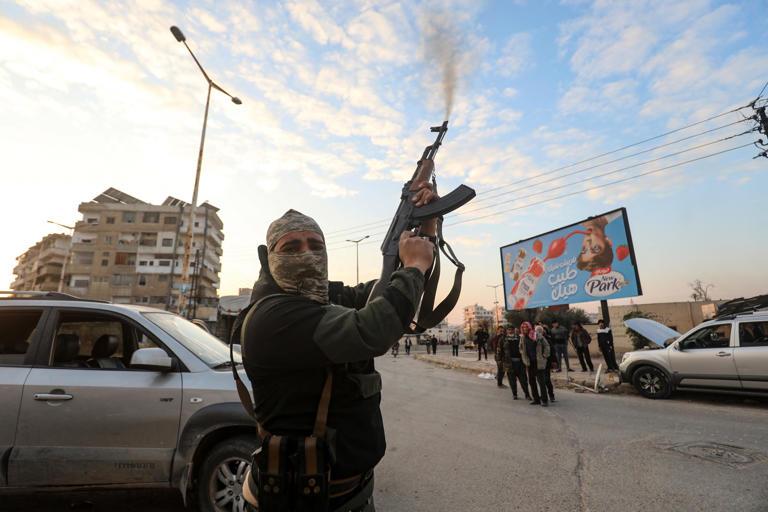
Hamas Stays Neutral as Iran Allies Pledge Support for Assad Against Rebels
A senior Hamas official has told Newsweek that the Palestinian group would not take sides in the renewed battle between the Syrian government and a coalition of insurgents as other factions backed by Iran pledged their support for Syrian President Bashar al-Assad.
“This is not our battle,” Hamas spokesperson and Political Bureau member Basem Naim told Newsweek. “Our battle is with the Zionist occupation, and our first goal is to liberate our country from colonialism.”
“We wish Syria all the best, stability and prosperity and that the internal problem be resolved through dialogue and on the basis of national partnership,” he added, “because the only beneficiary of internal fighting and instability is the Zionist enemy.”
Hamas and Israel have been locked in their longest and deadliest war since the Palestinian group launched a surprise attack against the United States-allied country on October 7, 2023. The conflict has expanded over these past 14 months, with Iran and factions of its Axis of Resistance coalition conducting attacks on Israel from other fronts, including Lebanon, Iraq, Syria and Yemen.
Just as a ceasefire was secured between Israel and Hezbollah in Lebanon last week, however, rebels of the Islamist Hayat Tahrir al-Sham and Turkey-backed Syrian National Army conducted a surprise offensive against the Syrian government, so far seizing much of the country’s second-largest city, Aleppo, and announcing on Wednesday the capture of the city of Hama.
Assad, a supporter of the Axis of Resistance who has been aided by Iran and Russia throughout his country’s 13-year civil war, has struggled to reorganize defensive lines in the face of rapid opposition gains.
Iranian Chief of Staff Major General Mohammed Hossein Baqeri held phone calls Tuesday with top military officials from Iraq, Russia and Syria in a bid to coordinate efforts to back the embattled Syrian government.
He alleged “a coordinated American-Hebrew plot to weaken Syria, its allies and the Resistance Axis,” according to Iranian media, echoing the position of Iraq’s Nujaba Movement militia, whose spokesperson told Newsweek on Saturday would be coming to Assad’s aid.
The U.S. and Israel have both denied any direct involvement in the events in Syria but have recently conducted strikes against Axis of Resistance factions they considered threatening to their respective interests.
“CENTCOM is not involved in the ongoing situation in Northern Syria,” a U.S. defense official told Newsweek, referring to U.S. Central Command. “CENTCOM always retains the inherent right to self-defense wherever and whenever attacked. The protection of our service members anywhere is paramount, and we will not hesitate to take appropriate action to defend them or to respond at a time and place of our choosing.”
CENTCOM announced Tuesday that it had “destroyed several weapon systems” in eastern Syria in response to what was said to be a rocket attack against U.S. forces in the vicinity.
U.S. troops have been deployed to Syria for nearly a decade in support of the Kurdish-led Syrian Democratic Forces (SDF), which have both clashed and allied with the Syrian government at times but considers the latest rebel offensive to be a threat to its positions.
Responding to Newsweek’s question during a virtual press briefing Tuesday, an IDF official said that “we are definitely monitoring what’s happening in Syria” and “we have an eye open for that.”
“That is not something that is posing a threat currently on us, but we have to be aware of what’s happening and monitor it,” the IDF official said. “Before these events started, we were operating to prevent Iran from arming Hezbollah again through Syria, before October 7, since October 7, and we will continue doing so as we understand that Iran might want to rearm Hezbollah for Syria.”
The IDF, which has conducted strikes against suspected Iran-linked positions in Syria throughout the country’s civil war, struck sites adjacent to the Lebanon-Syria border on Saturday, alleging the presence of Hezbollah weapons smuggling activities.
A Hezbollah spokesperson told Newsweek on Monday that “the Syrian Army does not need fighters” and “can defend its land.”
In a speech on Wednesday, Hezbollah Secretary-General Sheikh Naim Qassem also accused the U.S. and Israel of sponsoring the rebel offensive in Syria. He said that the Lebanese group would “will remain by Syria’s side.” Qassem also expressed continued support for Palestinians and called on Arab and Muslim nations to take action against Israel.
While Hezbollah and other largely Shiite Muslim factions of the Iran-aligned Axis of Resistance have forged close ties with Sunni Muslim Hamas in recent years over their mutual opposition toward Israel, the Palestinian group had initially backed the predominantly Sunni Muslim opposition forces in Syria after they first took arms against Assad, a member of the Alawite branch of Shiite Islam, in 2011.
During Friday prayers in Gaza in early 2012, late Hamas Political Bureau chief Ismail Haniyeh extolled open support for the insurgency. Ten years later, with Assad having emerged victorious across much of the country, other top Hamas officials met with Assad in Damascus to restore ties.
Haniyeh was assassinated in the Iranian capital of Tehran in late July in an operation largely attributed to Israel. His successor, former Gaza chief Yahya Sinwar, was killed during an IDF raid in Gaza in October.
Source » msn





